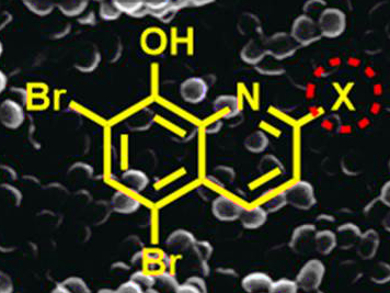The increased use of antibiotics for the treatment of various diseases has led to the evolution of antibiotic-resistant bacterial strains that cause immense problems in modern medicine. New antibiotic alternatives against resistant bacteria are urgently needed.
Additionally, the formation of bacterial biofilms, which are also resistant to current antibiotic strategies, plays a significant role in human health. There are an estimated 17 million biofilm-related infections that may cause more than 500,000 deaths in the U.S. alone each year. Just recently, halogenated quinolones have been identified as efficient antibiotics against resistant bacteria. These compounds can also eradicate bacterial biofilms.
Robert W. Huigens III, University of Florida, Gainesville, USA, and colleagues synthesized a broad array of quinolines (pictured) which are halogenated at the 2-position, generating diverse structures. Among the 39 synthesized compounds, several derivatives that have been alkylated or aminated at the 2-position have potent antibacterial and biofilm eradication activities, while being almost nontoxic to normal cells.
According to the researchers, halogenated quinolines are promising antibiofilm agents and could lead to useful treatments against persistent bacterial infections.
- Synthetically Tuning the 2-Position of Halogenated Quinolines: Optimizing Antibacterial and Biofilm Eradication Activities via Alkylation and Reductive Amination Pathways,
Akash Basak, Yasmeen Abouelhassan, Verrill M. Norwood, Fang Bai, Minh Thu Nguyen, Shouguang Jin, Robert W. Huigens,
Chem. Eur. J. 2016.
DOI: 10.1002/chem.201600926




